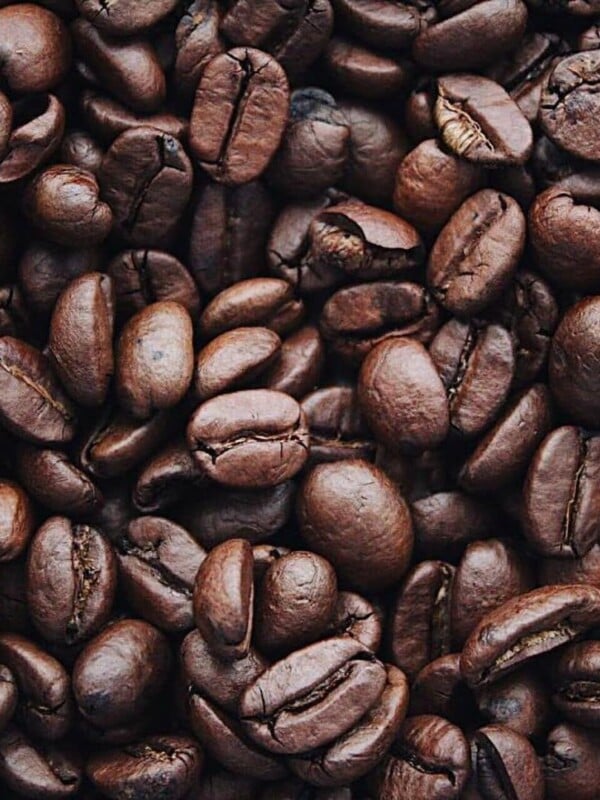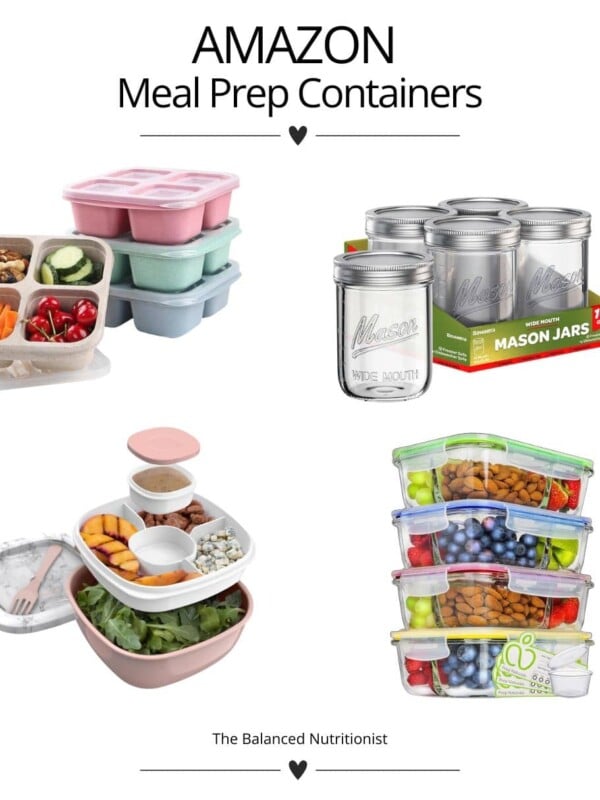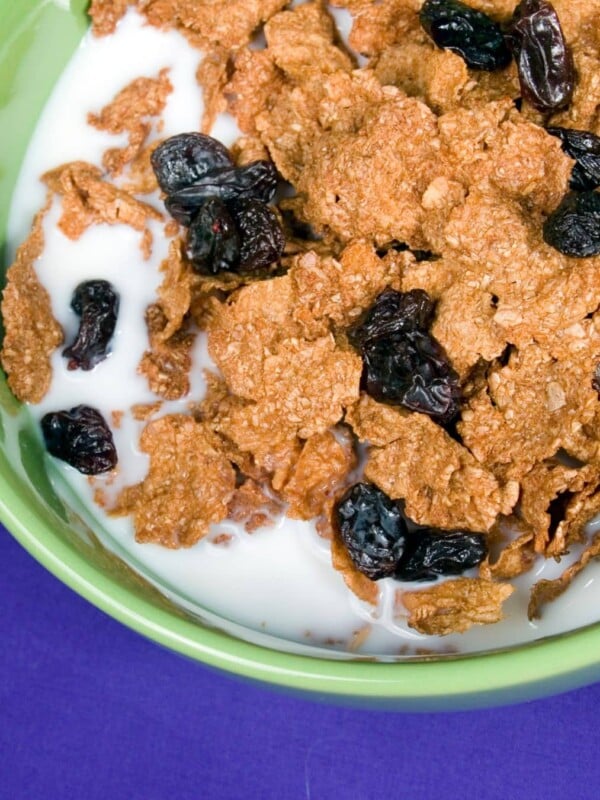This post may contain affiliate links. Please read our disclosure policy.
You finish the last few bites of your dinner and notice that feeling surfacing again… the unmistakable feeling of guilt. You just can’t seem to shake it, and you hear that little voice that says “why do I feel guilty after eating?”
If you’ve ever experienced guilt after eating, you’re certainly not alone – I’ve been there myself. But what is that feeling and where does it come from?
In this post, we’re going to talk about what food guilt is, how it develops, and ways to help you overcome it.
Hi, I’m Jamie, a Registered Dietitian of 8+ years. I’ve experienced firsthand the feeling of food guilt, scale obsession, and constant on-again-off-again dieting. Now, I use my experience to help other women find a balance with food, ditch their diets, and eat the foods they love.
Let’s dive in with what food guilt is.

What is food guilt?
Food guilt is the feeling of shame or regret you experience after eating something you’re not “supposed” to. It’s a learned emotion that makes you feel like you’re deserving of blame.
When it’s related to food, you might feel like you ate “too much” or indulged in “bad foods.”
Food guilt can feel overwhelming and relentless, and it can seriously impact your mental health.
Where does food guilt come from?
Whether we like it or not, we live in a diet culture – one that teaches us our worth is tied to weight loss goals. Even though it’s a completely unsustainable way to live, the culture trains us to feel like we simply don’t have enough willpower when we “break the rules” of an outrageous diet.
You see it in ads that constantly pressure you to buy weight loss supplements, or a subscription to the latest diet app, and even social media influencers selling diet products.
In America alone, people spend $33 billion every single year on weight loss products (1).
With all of these things around us, it’s easy to get sucked into the diet mentality, but this doesn’t mean you’re doomed to feel guilty about eating forever! It’s important to remember there’s a reason so many companies want you to believe you need a diet.
Why? Because they want you to buy something from them. And keep coming back. Surrounded by diet culture, you’ve been conditioned to feel guilty for eating the “wrong foods.”
So, how can you stop feeling guilty after eating?

How to stop feeling guilty after you eat
Shedding that icky feeling after eating takes time, but it’s definitely not impossible. To “unlearn” this negative emotion, here are a few things you can do.
Remember: practice makes progress. Give yourself grace as you practice these new strategies.
Ditch dieting
The first step to stop feeling guilty after eating is to throw dieting out the window.
Despite everything you may have been told, you don’t need to be on an overly restrictive diet to be healthy. Not following the “all-or-nothing rules” of these diets can make you feel like an absolute failure. But I’m here to tell you, you’re not!
Instead of cutting out all carbs, practice making sure carbs aren’t the only thing on your plate. Instead of going cold turkey on sweets, practice mindfulness when you eat them.
When you restrict certain foods you’ve deemed “junk foods” or sometimes even entire food groups, you actually tend to crave them more in the long run.
And if you’re eating far less energy than your body needs, your hunger is going to work hard to get your attention (cue the feeling outta control and binge eating).
Instead of restrictive diets, try eating enough foods that nourish you first. Eat a balanced, colorful plate of greens, fiber-filled carbs, and satiating proteins. The key here is to find food that you actually enjoy.
When you finish a nutrient-dense meal full of your favorite foods, you might be surprised by how satisfied you are!
If you still have room for a sweet treat after your delicious meal, it’s OK to enjoy it. Guilt-free. When you give yourself the freedom to eat without guilt, you’re on your way to building a positive relationship with food.
Work on a healthy relationship with food
The next step is building a healthy relationship with food.
When you build a healthy relationship with food, you enjoy the food you love without over-restriction, and accept that the value of what you eat is more than just the numbers on the nutrition label.
Most importantly, you truly believe that your self-worth is not determined by what you eat.
In a healthy relationship with food, you don’t see foods as “good” or “bad,” and respect your body’s hunger cues. You choose to eat in moderation and choose meals that make you feel best.
A great way to think about foods is this: There are no good foods or bad foods, they’re just different. Broccoli probably plays a different role than chocolate cake in your life, for example.
Reminder: this process is NOT perfect, and some days it might feel easier than others. Building this positive relationship is a life-long endeavor that many people experience.
To improve your relationship with food, focus on the positives and celebrate your wins regularly. Instead of shaming yourself for eating a dessert, applaud yourself for eating it mindfully. Instead of stressing over carbs, celebrate eating nourishing meals that give you energy.
Make realistic and maintainable habit changes
Any change that you decide to make in life has to be realistic and maintainable, or it won’t stick. I don’t know many newbie runners who start their training plan with a 26-mile run. Do you?
One of the best ways to approach habit changes is start small and make micro-adjustments as you work on these smaller changes.
Imagine you order a really sweet coffee drink every morning before work. You start your day at the drive-thru and enjoy every sip, but you notice you always experience a nasty sugar crash and feel starving a few hours later.
You decide you want to make a change. You want to start your day with something more filling.
Instead of ditching your daily routine altogether, swapping your typical coffee for something with less sugar 2 mornings a week might be a more reasonable approach. Once you recognize the positive effects, keep adjusting until you’re happy with the balance.
Figuring out what works for you is like an experiment. If you don’t like the outcome the first time, that’s OK – that just means it’s time to try something different.
Remember, if you want a habit to stick, you have to like your new habit better than the old one.
Slowww down
It’s no surprise that studies show slowing down and paying attention to what you eat makes you feel more satisfied with your meal (2).
With our busy schedules, it’s tempting to scarf down a sandwich or a slice of pizza in minutes and race back to the office. But the communication between your stomach and your brain is slow: it takes about 20 minutes for your brain to recognize that you’re actually full (3).
If you’re in a habit of eating quickly, it’s a lot more likely that you’ll eat more than you actually need. And then as your belly feels uncomfortably full, your guilt after eating is right behind.
To avoid racing the clock, try to plan your meals – or snacks – the night before. Packing leftovers to work or meal prepping on the weekend can relieve so much stress, and decision fatigue, around meal times.
Focus on mindful eating
If you’re like me, you’ve probably scrolled through social media while eating your lunch and suddenly realized the entire meal was gone. It seemed like only seconds before the entire thing vanished. You don’t really remember the details of what you ate, or what it tasted like exactly.
The solution? Mindful eating. Put the phone down. Turn off the TV. Close the book. Researchers have found we mindlessly eat more when we’re distracted, especially by phones (4).
Give your food your full attention! Notice the textures, flavors, and consistency of your meal. What’s your favorite part? How does it make you feel?
Be mindful of what you’re eating and how your body responds to every bite.
Then, recognize when you feel satisfied and stop there. There’s no need to eat until you’re overfull and feeling miserable. I know this can be a hard habit to break, especially if you grew up as a member of the “Clean Plate Club.”

How to stop feeling bad after eating something “unhealthy”
Friends, it is perfectly okay to eat fun foods like cookies, chips and processed foods sometimes. There are no forbidden foods. But if you’ve been following rules that those foods are NOT okay, guilt might come knocking. Here is how to let that guilt go.
Let go of the “all or nothing diet” mentality
If you’ve followed diets on and off for years, it’s easy to feel like you’re failing if you eat the foods you once labeled as “unhealthy.” But you can and should have the freedom to eat fun foods in moderation.
The vicious cycle of “all or nothing” dieting mentality isn’t helping you eat a healthy diet. In fact, it’s probably doing the opposite (and hurting your mindset in the process).
Have you ever eaten something “bad” and then said: ‘Oh well, I already messed up so I might as well eat as much as I can until I start over”. Yeah, me too! That’s a perfect example all or nothing diet cycle. The problem is that it never ends and you end up eating worse, not better.
If you’re craving a chocolate chip cookie, it’s fine to eat it and move on! If you want to add something to make it more balanced you can even pair it with another food group, like a protein. For example, you could crumble it on top of Greek yogurt to add protein to your snack.
Always remember, you’re not “failing” if you’re not perfect. The foods you might consider “unhealthy” are downright delicious, and it’s only human to crave them from time to time. It’s perfectly fine to eat a balance of nutrient-rich foods and “fun” foods.
Realize the perfect diet doesn’t exist
Remember the perfect diet doesn’t exist and never will. If it did, everyone would follow it, wouldn’t they?
There’s no unicorn solution, diet pill or particular foods that holds the answer. The “perfect” diet is the one that fuels you, includes all kinds of food you love, and is sustainable.
What you need will be a little bit different than what your friend needs, and that’s okay! Finding what your balance of healthy eating habits look like is essential to your long-term success.
No matter what the health gurus say, cutting out entire food groups completely isn’t a magic diet fix, and it just isn’t realistic. Restrictive eating habits don’t work.
Every individual person has to find what works best for them, and that takes constant lifelong trial and error.
True health and wellness is flexible and adaptable, not rigid and unforgiving. There’s no such thing as a perfect diet.
Remember food is more than calories
Food does sooo much more than just provide nutrition. We eat for enjoyment, to celebrate birthdays, weddings, promotions and so much more.
This is perfectly normal, and you should be able to enjoy these exciting moments without fearing your food.

Occasional emotional eating is normal
You’re not the only one who had a rough day and turned to a tub of Ben & Jerry’s or a pack of Oreos for comfort.
Food can provide us with comfort, and that is TOTALLY okay sometimes. Food can be a source of comfort for us, just make sure you’re working on other coping skills too so that it’s not your only outlet.
If you find yourself in this position, you aren’t weak and don’t need to feel guilty. Realize that everyone experiences this from time to time, and the negative feelings will pass.
Which brings me to my next point…
Practice eating and “moving on”
We have lots and lots of opportunities all week long to make food choices that align with our healthy eating goals. After you eat something that maybe isn’t the “healthiest,” practice letting it go and moving on.
The next time you’re feeling guilty after eating, take a deep breath and remind yourself, “This one food decision doesn’t make or break my health goals.”
If you think it’s an eating experience you can learn from, you can ask yourself: what happened here? Is there anything I can take from this moving forward?
Dwelling on a single food decision will only spiral you further into the “all or nothing” cycle and prevent you from actually eating a balanced diet.
Key Takeaways: You can escape food guilt
Although it’s unpleasant to have feeling of guilt, you’re not alone. Many people feel defeated after eating something they consider “unhealthy.” Guilty feelings and feelings of shame are unfortunately common, but definitely not normal.
But it’s important to know it’s possible to eat without feeling bad. It takes time and a shift in thinking.
You deserve food freedom and guilt-free eating.
Always remember, you’re more than the foods you eat, and it’s better to enjoy a little bit of everything in moderation than to restrict yourself for the sake of a diet’s rules. If this post was helpful to you, consider sharing it with a friend!
You Might Also Love:
I Don’t Know What To Eat When Nothing Sounds Good
Why Do I Keep Eating After I’m Full (And What To Do About It!)














Thanks for sharing Jamie! Really great strategies. I love to share your recipes with clients too.